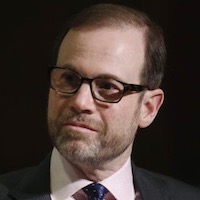News
Editor-in-chief unveils vision for high-tech Reuters
Thursday 4 October 2018

Reuters set out a vision for more automation aimed at "faster, more insightful news coverage".
President and editor-in-chief Stephen Adler (photo) said in a message to his 2,600 staff it means “continuing to build and hone a tech-enabled newsroom, in which we drive faster, more insightful news coverage by increasingly taking advantage of automation, artificial intelligence, and data analysis to complement and enhance the expertise of our journalists.”
He called for rapid adaptation as consumption habits change - on digital, mobile and social media platforms - and he referred to “having the right people in the right places” and “being flexible enough to alter our geographic and skills mix as the changing marketplace requires”.
Adler wrote: “It means, more broadly, an outside-in, customer-first approach that focuses sharply on what our customers want and need, and then works backwards to make sure our internal processes produce, distribute and commercialize that coverage as intelligently and efficiently as possible. Just because something may have worked for us 20 years ago doesn’t mean it’s the best way to work today or tomorrow, and we will be rigorous in making any necessary changes so that we can thrive and grow.
“To operate this way, we have to hone a culture that embraces constructive change and recognizes that standing still means falling backwards. As a practical matter, we will need to be less wedded to old silos and traditional working patterns and more amenable, for instance, to forming virtual teams to attack multi-disciplinary or multi-location challenges, or to snap, shoot and edit on a mobile device.
“We will do all of this, of course, with a deep commitment to journalism’s high public purpose and strict adherence to the Thomson Reuters Trust Principles.”
Adler summarised the vision for the future as: “Reuters aims to be the most trusted and influential global news organization, leveraging our talent and technology to deeply engage our customers, enhance the quality and effectiveness of our work, expand our business, and serve the public interest.”
Many staff are already involved in working groups to plan and put in place initiatives that are designed to help fulfil the vision, Adler said. These include organisational, geographic, workflow and cultural changes, “all intended to make us faster, smarter, more flexible and more effective - and thus more successful - in 2020, 2025 and beyond.”
Adler’s message came two days after Reuters News became the sole remaining part of the Reuters organisation bought by Canada’s Thomson family in 2008 still under the control of the Thomson Reuters corporation.
On Monday, control of the terminals and data business known as financial and risk passed to private equity investors headed by Blackstone who renamed it Refinitiv. As part of that $20 billion deal, Refinitiv became the largest customer for Reuters News with a 30-year contract worth a minimum of $325 million annually. ■
- SOURCE
- Reuters
- « Previous
- Next »
- 510 of 2177